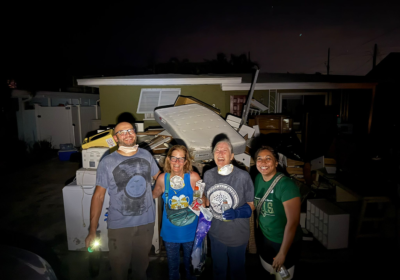‘We’re not getting respect’: USF Education majors fear future as teachers amid book bans

For Juliana Pinho, a freshman elementary education major, Florida’s recent book bans are disappointing because they may limit what kind of educator she can be.
“There are things that I wish kids would learn at school, and it is sad to see that I won’t be able to do anything about it. If this is the way book bans look like right now, how’s it going to be in the future when I am a teacher?” Pinho said.
She said she believes banning books is taking away educational opportunities from kids and narrowing educators’ teaching abilities.
“Book bans limit educators because they have more rules to follow, and it makes everything very limited. They have to really pay attention to what they are teaching and even filter some topics,” Pinho said.
Related: Some faculty, students consider leaving state due to DEI legislation
During the 2022-23 school year, book bans were put into effect in 153 districts in 33 states. Florida school districts accounted for more than 40% of all book bans. When compared to other states, Florida had the most book bans and the most school districts (33) that removed books, according to the Pen America Website.
The bans can be traced back to House Bill 1467, which went into effect on July 1, 2022. Per the law, each book accessible to students at a school library must be chosen by a school district worker with an approved educational media specialist credential, according to the Florida Senate Website.
Some titles that have been removed are multiple novels with LGBTQ+, religious and historic themes, with some including:
- “All Boys Aren’t Blue,” a story about Black queer boys
- “Gender Queer,” an autobiography about a self-identity experience
- “Beloved,” a Puliter prize-winning novel about enslaved people
- “The Fixer,” a story about a Jewish handyman
- “The Testaments,” a sequel to “The Handmaid’s Tales”
Some of USF’s education majors said that while they are not directly affected by the book bans as college students, they felt it will impact them when they become educators.
Junior elementary education major Grace Haerther said her professors have been discussing the book ban topic in class.
Haerther said it’s an interesting time to get a degree in education. Book bans have at least helped her understand that there are many different opinions on the topic.
“The conversations we have in class about the book bans are very informative. Our professors give us information on both sides, and I think it is really important for us to look at it that way,” Haerther said.
Teachers are being affected by the book bans, according to freshman education major Regan Williams – whose mother is a middle school history and government teacher.
Williams said that when it comes to certain topics such as slavery, it’s difficult for her mom to teach.
“It’s hard for my mom to teach the kids because some parents have this idea that white people are being blamed for causing slavery, and therefore, they think they are the victims when they are not the victims at all,” Williams said.
Senior elementary education major Morgan Manigold said it seems like Florida doesn’t trust its teachers. Having to scan every book that teachers put into their in-class library discourages literacy in the classroom, according to Manigold.
“Even though Florida has some of the best programs in the U.S. for education, it feels like we aren’t given that badge of trust anymore and that we’re not getting respect as educators. We can pick books that are appropriate for students,” Manigold said.
Haerther said she still isn’t sure she is going to teach in Florida because she has many concerns regarding the new legislation, especially while Florida is leading the country in book bans.
“I don’t see the book ban situation changing anytime soon. I’m going to be graduating in a year and a half, so I doubt that our government is going to do a complete 180 by that time,” she said.
Williams believes that the book ban puts a wall up between students and their teachers that blocks their abilities to learn, she said.
It takes away many of the ideas that kids need to learn at a young age so they can start to understand how the world works, Williams said.
The book ban will affect education majors once they graduate and find themselves in a classroom setting, according to Williams.
“I’ll have to be careful with what I say and what content I can show my students. If I can’t share certain views or ideas with the kids, I don’t know how I will be able to speak freely and be comfortable in a classroom setting,” Williams said.
Students need to make their own opinions based on their own knowledge and experiences, according to Harther. As students grow up in school, they form their own views, and banning certain books on certain topics deprives them of the power of knowledge, Haerther said.
“As educators, it’s our job to give students the skills to form their own opinions to be their own functioning members of society. If they want to read certain books, let that be their way of educating themselves,” Haerther said.






